 I'm
always intrigued by albums from blues artists that
I'm sure are going to take me into a lot of
different styles of music, and that's true with the
debut album from Roy Treviño. This guitarist
from South Texas is getting his recording career off
right, as the noted Jim Gaines is on-board to
produce Treviño's self-titled album for Troubadour
Records.
I'm
always intrigued by albums from blues artists that
I'm sure are going to take me into a lot of
different styles of music, and that's true with the
debut album from Roy Treviño. This guitarist
from South Texas is getting his recording career off
right, as the noted Jim Gaines is on-board to
produce Treviño's self-titled album for Troubadour
Records.
Nine of the ten cuts are original numbers, showing
Treviño to be a very fine composer in addition to a
versatile guitar player.
The disc gets underway with a nice uptempo blues
number, "Gloria," which starts off with nice
acoustic guitar accompaniment before Treviño starts
to show off just how talented he is when he uses a
slide on his electric axe.
If there's any question as to Treviño's main
influences, he answers that question on the second
cut, "The Boy Can Play," in which he mentions
notorious guitar slingers like Muddy Waters, Albert
Collins, Eric Clapton, Jimi Hendrix, Stevie Ray
Vaughan, and many, many more, all the while laying
down some ferocious blues guitar licks.
If you looked at Treviño's name and predicted that
there would be some Latin influences on this CD, you
guessed right. He goes bilingual on the
Santana-sounding "Sin Ella," one of my favorite cuts
on the CD, both for his vocals and his guitar
playing. David Boyle also comes in with some nice B3
playing. This song is one that I want to hear over
and over, and alone is worth the price of admission.
Another Spanish-flavored number is the pleasant,
jazzy "La Luna," on which Trevino plays very
tasteful acoustic guitar before coming in with
another Santana-ish electric guitar solo.
Just when you think you've figured this guy out,
Trevino delivers a wonderfully upbeat version of Bob
Marley's "Lively Up Yourself. " It's got the
requisite reggae backbeat but also has a nice Latin
feel to it.
Artists like Treviño keep the blues genre fresh and
invigorated, and we need more performers like him.
His first foray into the studio was definitely a
successful venture --- although it's a little
uneven, the high points are definitely pretty high
and show the potential for growth as he continues
his blues career. Regardless, I'll soon be
assembling my Top Ten albums for 2011 and you can
bet that this one's going to make the cut.
--- Bill Mitchell
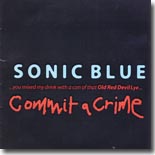 Commit a Crime is a small taster of a very
good blues band from England, Sonic Blue. The
band comprises Steve Brayne (guitar, harmonica and
vocals), Matt Percival (lead guitar), Steve Shone
(bass) and Richard Marcangelo (drums) and this
self-published CD is released as a sampler for the
band, but I feel it’s good enough to be reviewed
here because the band are obviously very talented.
I’m sure they would be happy to send some copies out
– e-mail
photo@stephenbrayne.com.
Commit a Crime is a small taster of a very
good blues band from England, Sonic Blue. The
band comprises Steve Brayne (guitar, harmonica and
vocals), Matt Percival (lead guitar), Steve Shone
(bass) and Richard Marcangelo (drums) and this
self-published CD is released as a sampler for the
band, but I feel it’s good enough to be reviewed
here because the band are obviously very talented.
I’m sure they would be happy to send some copies out
– e-mail
photo@stephenbrayne.com.
The CD opens with a good rendition of the old Sleepy
John Estes number, “Leaving Trunk.” This is a very
good version of an old standard brought up to date,
but without losing the flavour of the original. It’s
close, in places, to the Taj Mahal version but it
has Sonic Blue’s own stamp with great harmonica and
guitar work.
One of my all-time favourite tracks comes up next,
Sonny Boy Williamson’s “Help Me.” This has guest
musician Damon Butcher contributing some keyboard
work, which makes this version different from any
other that I’ve heard of this great song. The
harmonica and keyboards together work very, very
well.
The band has bviously worked hard to select some
good tracks to showcase their work, and their next
track is “Love Her With A Feeling.” The sleeve notes
attribute this one to Freddie King and Sonny
Thompson, who made a great version of it, but I
think it actually goes back to Tampa Red. Whoever
did it first, this is another good version with
Damon Butcher supporting again.
Unfortunately, this CD only features four tracks,
but they are all extremely well adapted and played,
as can be witnessed by the band’s version of Howlin'
Wolf’s “Commit A Crime.” I haven’t heard too many
cover versions of this song, and at first it seems
strange not to hear Howlin' Wolf’s gravelly voice.
However, that thought soon disappears as you enjoy
the way that the band has put the song together.
Damon Butcher gets a good keyboard solo going on
this track and really drives it along.
If this is just a sample of what this band can do,
then I’m looking forward to a full CD – hopefully in
the not too distant future!!
--- Terry Clear
 Norwegian guitarist Vidar Busk moved to the
USA at the age of 15 and played in US blues bands
before returning to his home country of Norway in
1990. He started a band in 1996 and released three
CDs, but the band broke up in 2000 and he started on
a solo career before starting his new band, Bubble
Of Trouble, which is the band on this new CD,
Troublecaster (Blue Mood Records). The band is a
three piece, with Ole Evensen on upright bass and
Alexander Pettersen on drums supporting Busk, and
they play a mix of blues, rock and rockabilly music.
Norwegian guitarist Vidar Busk moved to the
USA at the age of 15 and played in US blues bands
before returning to his home country of Norway in
1990. He started a band in 1996 and released three
CDs, but the band broke up in 2000 and he started on
a solo career before starting his new band, Bubble
Of Trouble, which is the band on this new CD,
Troublecaster (Blue Mood Records). The band is a
three piece, with Ole Evensen on upright bass and
Alexander Pettersen on drums supporting Busk, and
they play a mix of blues, rock and rockabilly music.
The album opens with a heavy rocking blues, “Are You
With Me Baby,” before settling down a bit with the
Tiny Bradshaw number “Train Kept A-Rollin’.“ This
number showcases what the band is capable of and
it’s a very well executed number, updating Tiny
Bradshaw to the new millennium.
The following track, “Jeanie, Jeanie, Jeanie,” is a
1950s flavoured up-tempo rock n roll track, easy to
jive to (if that’s your thing), with piano supplied
by guest musician Dag Yri, and then things slow way
down with an old Jessie Mae Robinson song called
“Sneakin’ Around.” This is a nice '50s style slow
rock ballad, full of the influence of the original.
“Hurry Up and Wait” is a rockabilly number, with the
upright bass at the forefront, leading into “Crazy
Ol’ Barrytone” which has some fantastic saxophone
supplied by Giale Roen Johansen. There is a nice
duel going on between the sax and the guitar that
really makes your foot tap.
Track seven, “One Eye Open,” is a frenetic rock 'n'
roll track performed by the trio without any guests,
and it then makes way for “Alabama Bloodhound,”
again just the trio, but Busk suddenly lets rip here
with some heavy guitar work, some influence from
Hendrix & Stevie Ray Vaughan perhaps. The bluesiest
track on the album.
The title track of the album, “Troublecaster,”
features guest Jerry Jones on electric sitar!
Unfortunately, this track did nothing for me at all,
and I really don’t see how it fits in with the rest
of the music on the CD.
The last two tracks are back to the regular style of
the rest of the CD, and finish of the album quite
nicely.
Not a bad opening CD for the new Vidar Busk band.
--- Terry Clear
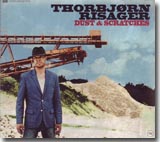 Dust & Scratches (Cope Records) is the sixth
CD from Danish bluesman Thorbjorn Risager,
the follow-up to the 2010 Track Record. It
features 11 tracks, nine written by Risager himself,
and the remaining two by guitarist Peter Skjerning,
and it opens with a heavy, up-tempo “Single Tear”
before dropping down to almost a ballad, “More.”
Dust & Scratches (Cope Records) is the sixth
CD from Danish bluesman Thorbjorn Risager,
the follow-up to the 2010 Track Record. It
features 11 tracks, nine written by Risager himself,
and the remaining two by guitarist Peter Skjerning,
and it opens with a heavy, up-tempo “Single Tear”
before dropping down to almost a ballad, “More.”
Track three, “Back Home,” is a slow and moody blues
with good lyrics and an excellent mix of
instruments, including some nice saxophone work from
Kasper Wagner. The tempo picks up into a nice rhythm
for “In The Back Of My Mind,” to my mind one of the
best tracks on the CD with lovely keyboard work from
the talented Emil Balsgaard.
The album continues, with tempos covering most
speeds, through seven more very good tracks,
finishing on “House Rocking Band”, a big band number
of blues and soul.
All in all, a worthy follow up to the 2010 Track
Record.
--- Terry Clear
 It’s
already been a good year for singer/guitarist
Dani Wilde. The young British artist has turned
heads as part of the Girls With Guitars album
with Cassie Taylor and Samantha Fish, along with the
accompanying tour. Now, she’s released her second
disc for Ruf Records, Shine, a strong set of
blues and soul that will please her current fans and
also attract plenty of new ones in the process.
It’s
already been a good year for singer/guitarist
Dani Wilde. The young British artist has turned
heads as part of the Girls With Guitars album
with Cassie Taylor and Samantha Fish, along with the
accompanying tour. Now, she’s released her second
disc for Ruf Records, Shine, a strong set of
blues and soul that will please her current fans and
also attract plenty of new ones in the process.
For her sophomore effort, Wilde recruits veteran
producer Mike Vernon to work the controls. She also
brings back her brother, Will “Harmonica” Wilde, who
does his best to blow the back off his harmonica
once again. The emphasis this time around is more on
the soul side of the blues, but Wilde’s guitar work
doesn’t take the disc off, as she continues to
impress on tracks like “Some Kinda Crazy” and “Red
Blooded Woman.”
Wilde also penned nine of the 11 tracks for Shine,
emerging as a strong composer expanding the scope of
blues topics and themes. “Don’t Give Up On Me”
bristles with dark passion and “I Don’t Even Care”
with defiance. “How Do You Do It” has the feel of a
late ’60s/early ’70s Aretha Franklin track with its
deep gospel flavored soul and a supple vocal from
Wilde, and “Born To Love Him” has a strong Chicago
vibe with some taut harmonica work.
On “Abandoned Child,” the young artist takes on a
subject near and dear to her heart --- supporting
young children and schools in Kenya. This sensitive
number features guitar work from Laura Chavez, who
shined on the 2008 Blues Caravan tour and who I
promise you will be hearing more about in the
future.
Providing outstanding support is a large group of
musicians, including bassist Roger Innis (Chaka
Khan), drummer Jamie Little, keyboard player Pete
Wingfield (Chris Rea, Buddy Guy), and Van Morrison
horn section members Martin Winning and Matt
Holland. In addition to Chavez, guitarists Ben Poole
and Stuart Dixon provide superb fretwork.
Shine is an excellent second release for Dani
Wilde, improving on her previous effort and also
showing that she’s continuing to expand her talents
and become a more complete performer. The sky is the
limit with this talented performer.
--- Graham Clarke
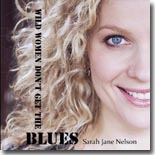 Sarah Jane Nelson got it at an early age.
While in junior high in Monroe, LA, she found a box
set of Robert Johnson’s recordings. One of her
favorite musicians, Eric Clapton, had endorsed the
set, so she gave it a listen and she understood that
the blues was the source of all the other music
(rock and country) that she knew and loved. Later,
as an actress in New York, she was part of the
popular show, “It Ain’t Nothin’ But The Blues,” and
got her first taste of singing the blues
professionally, and she took to it like a duck to a
junebug.
Sarah Jane Nelson got it at an early age.
While in junior high in Monroe, LA, she found a box
set of Robert Johnson’s recordings. One of her
favorite musicians, Eric Clapton, had endorsed the
set, so she gave it a listen and she understood that
the blues was the source of all the other music
(rock and country) that she knew and loved. Later,
as an actress in New York, she was part of the
popular show, “It Ain’t Nothin’ But The Blues,” and
got her first taste of singing the blues
professionally, and she took to it like a duck to a
junebug.
Now located in Oregon, Nelson recently released a
laidback session of backporch blues called Wild
Women Don’t Get The Blues. This set features
Nelson’s sweet and sultry vocals backed by her
longtime collaborator, singer/guitarist Michael
“Hawkeye” Herman, Big Irv Lubliner on harmonica, and
Tom Freeman on percussion.
Wild Women Don’t Get The Blues consists of 13
tracks, 12 covers of familiar songs which are given
a fresh spin, thanks to the incredible vocal gifts
of Ms. Nelson. She’s comfortable performing songs by
artists as diverse as Billie Holliday, Ida Cox,
Jimmy Reed, Robert Johnson, George Gershwin, and
T-Bone Walker. She moves seamlessly from tracks like
the jazzy pop stylings of “Summertime” and “Nature
Boy” to the grit and sass of “Nobody Knows You When
You’re Down and Out” and the title track.
Herman provides superlative backing on guitar and
even adds vocals to the Jimmy Reed track, “Baby What
You Want Me To Do.” This sounds an awful lot like a
group of buddies getting together to play the music
that they love, just for each other, intimate and
warm. That alone makes Wild Women Don’t Get The
Blues a disc worth hearing, but you really
shouldn’t miss the opportunity to give Sarah Jane
Nelson a listen. You can thank me later.
--- Graham Clarke
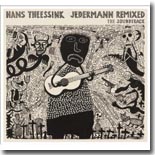 Hans Theessink is considered by many to be
one of the top blues and roots musicians in the
world. Over a 40 year career, the Dutch guitarist
has released 25 albums, a songbook, a blues guitar
instruction manual, and a DVD, and averages about
150 concerts a year. Recently, Theessink was asked
by provide the music to Hannes Rossacher’s "Jedermann
Remixed," a movie celebrating Jederman, which is an
Austrian adaptation of the English morality play,
"Everyman." The final product, Jedermann Remixed:
The Soundtrack (Blue Groove), consists of 18
tracks, 14 covers of songs by a diverse set of
musicians, plus four original compositions by
Theessink. It’s much more than a soundtrack,
however, as it also gives you a vivid picture of the
musician who assembled this collection.
Hans Theessink is considered by many to be
one of the top blues and roots musicians in the
world. Over a 40 year career, the Dutch guitarist
has released 25 albums, a songbook, a blues guitar
instruction manual, and a DVD, and averages about
150 concerts a year. Recently, Theessink was asked
by provide the music to Hannes Rossacher’s "Jedermann
Remixed," a movie celebrating Jederman, which is an
Austrian adaptation of the English morality play,
"Everyman." The final product, Jedermann Remixed:
The Soundtrack (Blue Groove), consists of 18
tracks, 14 covers of songs by a diverse set of
musicians, plus four original compositions by
Theessink. It’s much more than a soundtrack,
however, as it also gives you a vivid picture of the
musician who assembled this collection.
The play "Jedermann" presents God, Death, and Satan
as characters. These three abstracts are major
pieces of most blues compositiions, so it was only
natural that Theessink uses the blues as his musical
vehicle. In the play, the wealthy Everyman is faced
with Death and Judgment and abandoned by his
friends, money, and servants during his final
journey, but is given the opportunity for repentance
before it’s too late.
The songs, both the covers and Theessink’s
originals, capture the mood of the play itself
perfectly. The disc is pretty low key, most tracks
feature only Theessink playing guitar (or banjo,
mandolin, mandocello, mandoguitar, harmonica, and
all manner of keyboards) and singing in his
fantastic deep, burnished style, but it burns with
intensity and emotion. Theessink selected a diverse
group of cover tunes for this soundtrack, with songs
from Tom Waits (“Way Down In The Hole”), Johnny Cash
(“The Man Comes Around”), Jagger and Richards (“No
Expectations” and “Sympathy For The Devil”), Bo
Diddley (“I’m A Man”), Nick Lowe (“The Beast In
Me”), Ray Charles (“I Got A Woman”), Hank Williams
(“The Angel of Death”), Memphis Slim (“Mother
Earth”), Curtis Mayfield (“People Get Ready”), and
Joe South (“Games People Play”). Now that’s not
exactly your basic track list for a blues
collection, but they really work together well in
Theessink’s capable hands.
There are also some fine reworkings of traditional
tunes (“Satan, Your Kingdom Must Come Down,” “You
Gonna Need Somebody On Your Bond,” and “O, Sinner
Man”), plus Theessink’s own songs are exceedingly
well done. He also receives understated, but sublime
support on various tracks from a wonderful set of
background vocalists (Dumisani Moyo, Blessings Nkomo,
Vusa Ndlovu, Meena Cryle, with Bobby King and Terry
Evans appearing on a couple of tracks), plus
Maximillan Djokic (cajon), Tobias Tautscher and
Erich Buchebner (double bass), Knud Møller (electric
guitar, viola, pump organ), Morton Eriksen
(percussion), and Harry Stampler (drums).
If you’ve not experienced the music of Hans
Theessink, I would recommend Jedermann Remixed:
The Soundtrack as a good place to get started,
mainly because of his splendid guitar work and
because this set features some familiar tunes and
you will be intrigued by his interpretations of
them. You will want to delve deeper into his catalog
after listening.
--- Graham Clarke
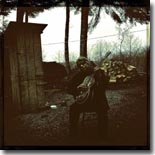 Dave Galanin may live in Alaska, but the blues of
the Mississippi Delta have saturated his soul. He
started playing the blues while living in New
Zealand, but has opened for acts like Guy Davis,
Steve Arvey, and Jake LaBotz. Playing under the
stage name of Strummin Dog, Galanin has
self-released his third CD, Signify, which
contains a dozen tracks, four originals and eight
Delta favorites.
Dave Galanin may live in Alaska, but the blues of
the Mississippi Delta have saturated his soul. He
started playing the blues while living in New
Zealand, but has opened for acts like Guy Davis,
Steve Arvey, and Jake LaBotz. Playing under the
stage name of Strummin Dog, Galanin has
self-released his third CD, Signify, which
contains a dozen tracks, four originals and eight
Delta favorites.
Signify captures Galanin’s guitar chops
perfectly, and he gets an opportunity to stretch out
on this mostly solo tracks (Gary Gouker plays
harmonica on three tracks and Lee Asnin adds second
guitar on Son House’s “Death Letter Blues.”). He
brings something new to each of the old classics,
retaining the basic melody for most, but making
various changes, like eschewing slide guitar on
Muddy Waters’ “Can’t Be Satisfied,” and giving
Robert Johnson’s “Traveling Riverside Blues” more of
a Piedmont flavor. “Catfish Blues” is given a swampy
atmospheric feel. Other highlights include another
Son House tune, “County Farm Blues,” and Charley
Patton’s “Pony Blues.” Galanin’s original tunes fit
smoothly with the standards, especially “Bring Her
Back Home” and “Good Woman Blues,” with their
old-school feel.
For those who dig the real, pure, and unvarnished
Mississippi Delta blues, all you need to do is check
out the considerable talents of Dave Galanin, a.k.a.
Strummin Dog. Signify is an excellent set of
blues, both new and old, that will satisfy your
soul.
--- Graham Clarke
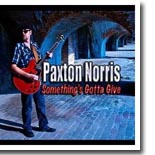 Paxton Norris is a
singer/guitarist/songwriter based in Michigan with
all the right influences. Having played regularly on
the Michigan blues scene since the early ’90s, he’s
absorbed the music of blues icons like the King
triumvirate (B.B., Albert, and Freddie) and Stevie
Ray Vaughan, plus the sounds of local legends like
Bob Seger, Motor City Josh Ford, and Larry McCray.
The resulting product is a guitar sound that mixes
Motor City grit, Motown soul, and blues/rock swagger
and a strong vocal style reminscent of the ’70s
blues/rock scene (Allman Brothers, Wet Willie,
etc.).
Paxton Norris is a
singer/guitarist/songwriter based in Michigan with
all the right influences. Having played regularly on
the Michigan blues scene since the early ’90s, he’s
absorbed the music of blues icons like the King
triumvirate (B.B., Albert, and Freddie) and Stevie
Ray Vaughan, plus the sounds of local legends like
Bob Seger, Motor City Josh Ford, and Larry McCray.
The resulting product is a guitar sound that mixes
Motor City grit, Motown soul, and blues/rock swagger
and a strong vocal style reminscent of the ’70s
blues/rock scene (Allman Brothers, Wet Willie,
etc.).
Something’s Gotta Give (Paxton Norris Music)
is Norris’ debut release, but you’d never know it by
the performances. Norris wrote 11 of the 13 tracks
and put his own fresh coat of paint on a choice pair
of covers (an almost unrecognizable Bobby Bland’s
“Love Light” and Freddie King’s “My Credit Didn’t Go
Through”). His own compositions are loaded with
passion and exuberance. Highlights include “Hear
Say,” which would have sounded just fine on a Motown
recording some 30 years ago, a pair of timely tracks
(“Living Tight” and “It’s Alright”), and a swinging
“That Woman’s Trouble,” which features the piano of
Victor Wainwright.
Norris gets lots of able assistance as well, with a
host of Detroit’s biggest names, including Motor
City Josh (who co-produced the disc with Norris, as
well as playing guitar and tamborine and writing
several songs), guitarist Tyler Mac, bass player
Chris Douglas, drummer Justin Headley, keyboardist
Mike Lynch, and backup vocalist Cathy Davis and
Stacia Ford.
Something’s Gotta Give is an impressive debut
from Paxton Norris. He appears to possess the total
package, with great songwriting, vocals and guitar
work. Hopefully, he will continue to develop and we
will be hearing much more from him.
--- Graham Clarke
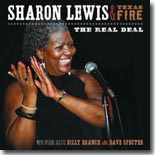 Sharon Lewis was raised in the church, but
discovered R&B and Motown at the age of nine. In the
mid ’70s, she moved from Fort Worth to Chicago and
encountered the blues first-hand via the Chicago
soul/blues singer Pat Scott. Since the mid ’90s,
Lewis has been active on the Chicago blues scene,
singing with Johnny B. Moore, Dave Specter, and
Harmonica Hinds, and later as lead singer for the
Mojo Kings, before forming her own band, Texas Fire,
in 2005.
Sharon Lewis was raised in the church, but
discovered R&B and Motown at the age of nine. In the
mid ’70s, she moved from Fort Worth to Chicago and
encountered the blues first-hand via the Chicago
soul/blues singer Pat Scott. Since the mid ’90s,
Lewis has been active on the Chicago blues scene,
singing with Johnny B. Moore, Dave Specter, and
Harmonica Hinds, and later as lead singer for the
Mojo Kings, before forming her own band, Texas Fire,
in 2005.
Lewis recently released her solo debut for Delmark
Records, The Real Deal. Lewis previously
recorded for Delmark Records in 2007, as a special
guest on Specter’s Live In Chicago CD/DVD.
For this release, she wrote eight of the 13
selections, including the timely, “What’s Really
Going On?” which addresses the current economic
downturn.
Her other compositions ably handle regular everyday
blues subjects, like “Do Something For Me,” “Blues
Train,” and the sassy title track, one of two tracks
which feature the Chicago Horns. She’s also adept at
other styles, jazzing things up (with help from
guitarist Specter) on “Silver Fox,” and reprising
the impressive ballad, “Angel,” from her appearance
on Specter’s disc.
The five covers are well-chosen, ranging from the
unfamiliar (Sam Taylor’s “Mother Blues,” Van
Morrison’s “Crazy Love,” Wynona Carr’s “Please Mr.
Jailer,”) to Ben E. King’s (via Aretha Franklin)
“Don’t Play That Song,” and a refreshing reggae
reworking of Bill Wither’s “Ain’t No Sunshine.”
Lewis is in good hands with support from guitarists
Specter and Bruce James, bassist Melvin Smith,
drummer Tony Dale, and keyboardist Roosevelt Purifoy.
Billy Branch stops by to add harmonica on two tracks
and Deitra Farr adds background vocals on a couple
of tracks as well.
With this impressive debut recording, Sharon Lewis
easily proves that she lives up to the album’s
title.
--- Graham Clarke
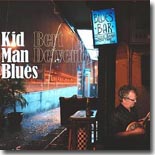 When Bert Deivert was in his mid teens, he
saw blues legend Son House on public television.
House’s performance so impressed the youngster, that
he broke a wine bottle to make his own bottleneck
and has been hooked on the blues ever since. Having
lived and traveled through much of the U.S. as a
youngster, he’s been a resident of Sweden since the
mid ’70s, working as a musician (playing mandolin
and slide guitar) and singer. He’s worked with
musicians of many genres from rock (Peter Case) to
rockabilly (Wanda Jackson) to Old Timey (Tom Paley)
to Irish (Christy O’Leary) to blues (Eric Bibb,
Michael Powers).
When Bert Deivert was in his mid teens, he
saw blues legend Son House on public television.
House’s performance so impressed the youngster, that
he broke a wine bottle to make his own bottleneck
and has been hooked on the blues ever since. Having
lived and traveled through much of the U.S. as a
youngster, he’s been a resident of Sweden since the
mid ’70s, working as a musician (playing mandolin
and slide guitar) and singer. He’s worked with
musicians of many genres from rock (Peter Case) to
rockabilly (Wanda Jackson) to Old Timey (Tom Paley)
to Irish (Christy O’Leary) to blues (Eric Bibb,
Michael Powers).
Most recently, Deivert has been gigging or recording
in Mississippi with some of the Delta’s finest (Bill
Abel, Terry “Harmonica” Bean, Cadillac John Nolden,
T-Model Ford, and the late Sam Carr. Some of these
artists appear on Deivert’s tenth and latest CD
release, Kid Man Blues (Hard Danger), a
project that spanned four years of recording on
three different continents.
Seven of the tracks were recorded in Sweden, ranging
from R.L. Burnside’s “Goin’ Down South,” which
features Deivert on mandolin and lap steel, plus
Memphis Gold on guitar, Nina Pérez on violin, and
Suchet Malhotra on cajon, to a winning pair from
blues mandolin master Carl Martin (“State Street
Pimp,” featuring Brian Kramer on guitar, and the
title track, with Deivert, Memphis Gold and My
Sohlin on vocals), a scorching slide version of
House’s “Death Letter,” Blind Blake (“Keep On
Truckin’ and “Diddie Wah Diddie”), and Sleepy John
Estes (“Special Agent”).
Three tracks, Skip James’ “Cypress Grove,” “Come
Back Baby,” and the enchanting closing instrumental,
“Nongharn Blues,” were recorded in Bangkok. On these
recordings, Deivert pairs up with Dulyasit “Pong”
Srabua for some wonderful interplay. The remaining
two tracks were recorded in Duncan, Mississippi with
Bill Abel and Sam Carr, with additional performances
added during a Swedish session (featuring Sven
Zetterberg on harmonica). These two tracks include a
fine new composition from Deivert (“Lula”).
Deivert alternates between mandolin and slide
guitar, playing both masterfully.
Though the majority of these songs are familiar,
older tunes, Deivert's fretwork give them a fresh
sound and feel. Kid Man Blues is a
marvelously diverse and satisfying set of acoustic
blues guaranteed to please.
--- Graham Clarke
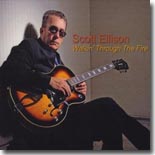 Scott Ellison spent several years in Clarence
“Gatemouth” Brown’s band before stepping out on his
own and developing his own sound as a performer and
a composer. Several of his songs have been featured
on TV shows and movies. During that time, he’s
recorded eight CDs, including his latest release,
Walkin’ Through The Fire (JSE Records), which
features 15 original compositions from two different
sessions. One session was produced and engineered by
Walt Richmond and the other was produced and
engineered by Charles Tuberville.
Scott Ellison spent several years in Clarence
“Gatemouth” Brown’s band before stepping out on his
own and developing his own sound as a performer and
a composer. Several of his songs have been featured
on TV shows and movies. During that time, he’s
recorded eight CDs, including his latest release,
Walkin’ Through The Fire (JSE Records), which
features 15 original compositions from two different
sessions. One session was produced and engineered by
Walt Richmond and the other was produced and
engineered by Charles Tuberville.
Ellison had a hand in writing all of the songs on
the disc, including the funky opener, “Hits Like
Dynamite.” “Shakin’ With The Blues” mix the blues
with greasy Memphis soul, and “No Way To Live” is a
dazzling jump blues. “You Talk Too Much” has a bit
of a Crescent City groove, while “Driftin’ Man” is a
midtempo blues rocker. On the same wavelength is
“Sweet Thunder,” which picks up the pace a notch.
The title track is another standout, with Ellison
providing one of his best vocal efforts over a
soulful backdrop. “Trouble Times” is more
blues/rock, with some sizzling slide guitar, and
“The Name of the Game” has a loose reggae rhythm.
The next couple of tracks (“All Things” and “Turn
Out The Lights”) turn back to the blues, however,
and the disc closes on a light-hearted note with the
humorous “The Man Who Shot Mustang Sally.”
Ellison’s guitar work is top notch, and his
gravelly, whiskey-smoked vocals continue to get
stronger with each release. Walkin’ Through The
Fire is another strong effort from Ellison.
Hopefully, this one will open a few more doors for
him, and get him a few more plays on radio.
--- Graham Clarke
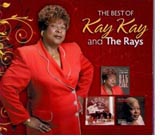 Kay Kay and The Rays got their start in 1997
as The Abner Burnett Blues Band. However,
keyboardist Burnett and bass player/composer Bob
Trenchard heard about a talented gospel singer named
Kay Kay Greenwade, who blew them away when they
heard her in person. Soon, the band’s name was
changed and good things started to happen. After
releasing their debut album and building a big
following in West Texas, the band was discovered by
soul/blues singer Johnny Rawls, who produced their
second release, Texas Justice.
Kay Kay and The Rays got their start in 1997
as The Abner Burnett Blues Band. However,
keyboardist Burnett and bass player/composer Bob
Trenchard heard about a talented gospel singer named
Kay Kay Greenwade, who blew them away when they
heard her in person. Soon, the band’s name was
changed and good things started to happen. After
releasing their debut album and building a big
following in West Texas, the band was discovered by
soul/blues singer Johnny Rawls, who produced their
second release, Texas Justice.
Over the next three years, the band’s popularity
increased, thanks to regional and national tours and
their 2003 performance at the 2003 W.C. Handy
Festival, which was broadcast nationwide on PBS.
This was followed by their Big Bad Girl
album, which garnered rave reviews, made the top ten
blues radio charts and resulted in a Australian
tour. The band split up soon afterward and Greenwade
suffered a stroke and other medical issues in
subsequent years.
Catfood has issued a compilation of Kay Kay and The
Rays’ finest moments on the appropriately titled
The Best of Kay Kay and The Rays. The collection
includes 15 songs taken from all three of the band’s
releases, which really showcase the band’s
effortless blending of soul, blues, and funk.
The band’s repertoire has always received a lot of
attention for their songs that were heavy on social
commentary. Songs like “Lone Star Justice,” “Enron
Field,” “Lord Save Me From L.A.,” “Junk Blues,” and
“Texas Justice – Billy’s Story” focused on social
and political injustice, taking swipes at
politicians, corporations, and other sacred cows.
However, the group also thrived on the more
traditional soul/blues numbers, too, such as “No
Mama’s Boy,” “Hey Big Boy,” Big Bad Girl,”
“Cheater,” “Love Me Baby,” and the duet with Rawls,
“Hold On To What You Got.” There are also a couple
of covers, including a funky reworking of the SRV
classic, “Crossfire.”
Greenwade’s vocals are a thing of wonder, with just
the right blend of soul, tenderness, grit,
sensuality, and passion. The Rays are, as they
continue to prove working behind Rawls and other
Catfood artists on tour and in the studio, one of
the best bands currently working. For soul/blues
fans who might have missed Kay Kay and The Rays the
first time around, this is a great place to catch
up.
--- Graham Clarke
 Sista Monica Parker got her start, like so
many other blues singers, in the church, joining her
church’s choir as a young teenager, even touring
with them in certain Midwest cities. After a stint
with the Marines, Parker started her own successful
business and moved to California, where she soon
decided to embark on a singing career. She enjoyed a
strong measure of success, releasing several blues
albums and a gospel album and earning the nickname,
“The Blues Lioness,” before being diagnosed with a
rare form of cancer in 2002. After a grueling couple
of years of radiation and chemo, she returned to the
music scene in 2004, and has released three strong
discs since that time.
Sista Monica Parker got her start, like so
many other blues singers, in the church, joining her
church’s choir as a young teenager, even touring
with them in certain Midwest cities. After a stint
with the Marines, Parker started her own successful
business and moved to California, where she soon
decided to embark on a singing career. She enjoyed a
strong measure of success, releasing several blues
albums and a gospel album and earning the nickname,
“The Blues Lioness,” before being diagnosed with a
rare form of cancer in 2002. After a grueling couple
of years of radiation and chemo, she returned to the
music scene in 2004, and has released three strong
discs since that time.
Living in the Danger Zone (Mo Muscle Records)
is her fourth disc since her triumphant return, and
it may be her strongest effort yet, which is really
saying something. “Hug Me Like You Love Me,”
inspired by a meeting with B. B. King, opens the
disc with horns blaring, Mike Schermer’s sizzling
guitar, and Andy Just wailing away on harmonica.
It’s a great way to kick things off. Parker wrote 10
of the 12 tracks here, and the highlights include
the funky title track, the excellent slow blues,
“Tears,” “Fierce Force of Nature,” “You Can’t Go
Back,” and “Sending You On Your Way.” She also
covers Robert Cray’s “The Forecast Call For Pain,”
and does a bouncy rendition of the traditional
“Glory Hallelujah,” with guest vocalist Kelley Hunt.
In addition to Just and Schermer, Parker gets
assistance from regular band members Danny Sandoval
(tenor sax), Don Caruth (guitar/background vocals),
Leon Joyce, Jr. (drums), Artis Joyce (bass) and
Danny “B” Beconcini on keyboards. Guest musicians
include Hunt (piano), Ruth Davies (acoustic bass),
Schermer, Vasti Jackson, Dan Caron, and Terry Hiatt
(guitar), Ron E. Beck, David Tucker, and Jeff
Minnieweather (drums), Carolyn Brandy (percussion),
Joel Smith (bass), and Abdul Hamid (Hammond B3). The
horn section includes Sandoval, Doug Rowan (sax),
and Chris Marquis (trumpet), and background
vocalists include Jeannine Anderson and Will Russ,
Jr.
Whether you’re talking about blues, soul, R&B, or
gospel, Sista Monica Parker can do them all, and do
them very well. She’s a masterful singer and
songwriter. Living in the Danger Zone is a
strong, varied set of blues that offers something
for everybody.
--- Graham Clarke
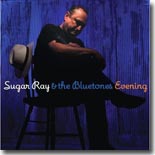 Sugar Ray & the Bluetones have produced a
consistently fine body of work over the past couple
of decades, featuring some outstanding guitarists
during that time, such as Ronnie Earl and Kid
Bangham. The band has also featured horns as a big
part of their music previously (front man Sugar Ray
Norcia led Roomful of Blues for a period during the
’90s). For their latest release (and fifth overall
on Severn Records), Evening, the Bluetones
leave the horns at home and play some down and dirty
Chicago-styled blues. There’s still an outstanding
guitarist on hand…..frequent guest collaborator
“Monster” Mike Welch, and the regular core group of
Bluetones (Neil Gouvin – drums, Michael “Mudcat”
Ward – bass, Anthony Geraci – piano).
Sugar Ray & the Bluetones have produced a
consistently fine body of work over the past couple
of decades, featuring some outstanding guitarists
during that time, such as Ronnie Earl and Kid
Bangham. The band has also featured horns as a big
part of their music previously (front man Sugar Ray
Norcia led Roomful of Blues for a period during the
’90s). For their latest release (and fifth overall
on Severn Records), Evening, the Bluetones
leave the horns at home and play some down and dirty
Chicago-styled blues. There’s still an outstanding
guitarist on hand…..frequent guest collaborator
“Monster” Mike Welch, and the regular core group of
Bluetones (Neil Gouvin – drums, Michael “Mudcat”
Ward – bass, Anthony Geraci – piano).
Norcia is a masterful harmonica player and a
versatile vocalist. He’s also a pretty accomplished
songwriter, having penned seven of the 12 tracks on
Evening (one track was written by Welch,
“Hard To Get Along With,” and one by Ward, “(That’s
Not Yet) One of My Blues”). Norcia’s contributions
include the humorous “Too Many Rules and
Regulations” “I’m Certain That I’m Hurting,” “Dear
John,” and “Dancing Bear (Little Indian Boy),” which
features Norcia on flute. The closing instrumental,
“XO,” is also a Norcia composition.
The three cover tunes all come from the ’40s and
’50s era --- the title track, made famous by Cab
Calloway, Johnny Young’s rousing “I’m Having A
Ball,” which opens the disc, and an excellent
rendition of the Otis Rush classic, “You Know My
Love.” The band’s new compositions blend
effortlessly with the standards and their
performances show why they’re one of the tightest
blues bands currently working. Welch’s presence
makes a great band even greater.
Evening is a wonderful set of old-school
blues, with a few modern touches thrown in, that
captures the classic sound of Chicago Blues as close
to perfectly as anyone will get these days.
--- Graham Clarke
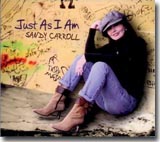 Singer/songwriter Sandy Carroll has spent
most of her career in Memphis, becoming a regular
presence on Beale Street as a performer, working
with Jim Dickinson and Willie Mitchell, and writing
songs for Luther Allison, Albert King, Ana Popovic,
Barbara Blue, Reba Russell, Ellis Hooks, and many
others. She has released several recordings since
the early ’90s and her latest, for Catfood Records,
is Just As I Am.
Singer/songwriter Sandy Carroll has spent
most of her career in Memphis, becoming a regular
presence on Beale Street as a performer, working
with Jim Dickinson and Willie Mitchell, and writing
songs for Luther Allison, Albert King, Ana Popovic,
Barbara Blue, Reba Russell, Ellis Hooks, and many
others. She has released several recordings since
the early ’90s and her latest, for Catfood Records,
is Just As I Am.
As might be expected, Carroll either wrote or
co-wrote (with collaborators Rick Steff, who also
played organ, William Lee Ellis, producer/husband
Jim Gaines, or Bob Trenchard) all ten tracks, nine
of which are new for the album. The lone holdover is
the title track, which was co-written by Carroll
with James Solberg and Luther Allison, who recorded
the track for his final studio release, Reckless.
Her new tunes address such issues as cheating Father
Time (“Help Mother Nature”), young love (“Romeo and
Juliet”), gratitude (“Blessed Be”), even advice for
a man wanting to treat his woman right (“Slow
Kisses”), and finding what you’re looking for right
under your nose (“Baby Comin’ Home”). The title
track is a sparse arrangement with Carroll
accompanied only by piano and gently wafting
accordion that sounds like a totally different
number than the Allison version.
It doesn’t hurt at all when your husband is one of
the best blues and roots producers currently
practicing, but it also helps to have great
musicians behind you. Carroll certainly has that
with a cast that includes drummers Steve Potts and
Derrick Young, bass players Dave Smith and Trenchard
(with Mike Lineburger, Scotty Young, and Brian
Kingsley), guitarist Evan Leake (with Dennis Lunpkin
on the title track), and Rick Steff, who plays piano
and accordion. The background singers include Reba
Russell, Daunielle “Pie” Hill, Kimberly Helton, and
Vicki Adkins.
However, none of that matters if your singer doesn’t
have what it takes to get the message across.
Carroll’s deep and assured vocals more than meet
that criterion. This is a fine set of down-home
soulful blues.
--- Graham Clarke
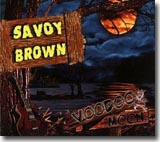 Forty-five years into their existence, it’s safe to
say that Savoy Brown is still a force in the
blues/rock world. Founder/guitarist Kim Simmonds is
still going strong, as he has since the band’s
heyday in the late ’60s/early ’70s, when the band
was backing John Lee Hooker during his ’67 UK tour
and their songs were being recorded by acts as wide
ranging as Little Milton, Rare Earth, and Great
White. Despite near constant turnover of band
members, with the exception of Simmonds, the band
has toured and recorded fairly regularly on numerous
labels. Recently Savoy Brown signed on with Ruf
Records and released their latest CD, Voodoo Moon.
Forty-five years into their existence, it’s safe to
say that Savoy Brown is still a force in the
blues/rock world. Founder/guitarist Kim Simmonds is
still going strong, as he has since the band’s
heyday in the late ’60s/early ’70s, when the band
was backing John Lee Hooker during his ’67 UK tour
and their songs were being recorded by acts as wide
ranging as Little Milton, Rare Earth, and Great
White. Despite near constant turnover of band
members, with the exception of Simmonds, the band
has toured and recorded fairly regularly on numerous
labels. Recently Savoy Brown signed on with Ruf
Records and released their latest CD, Voodoo Moon.
Though the membership changes, the one constant, the
x-factor to the band’s success and durability, is
the wondrous guitar work of Simmonds. Longtime fans
will feel right at home with his impressive leads
and his sound is fresh enough to attract newcomers
by the bushel basket as well. Indeed, the guitar
work really stands out on tracks like “She’s Got The
Heat” (with some blistering slide), “Shockwaves,”
“Meet The Blues Head On,” and the torrid
instrumental, “24/7.” The swampy rocker title track
is another standout.
This version of Savoy Brown features sax player/lead
vocalist Joe Whiting, Pat DeSalvo on bass, Garnet
Grimm on drums, along with keyboardist Andy Rudy and
Ron Keck on percussion. Whiting co-wrote a couple of
song with Simmonds and his capable vocals suit the
material well. Simmonds also takes the mic on a
couple of tracks, “Look At The Sun” and “Round and
Round.”
Savoy Brown has been making this kind of music for
nearly half a century. They show no signs of letting
up and Kim Simmonds is still a guitar force to be
reckoned with. Voodoo Moon is another fine
addition to their remarkably consistent catalog.
--- Graham Clarke
 Markey is a blues singer/songwriter based in
Nashville. Since she began her career in her late
teens, she has performed in clubs, on stage, in
theatres, festivals, TV and radio. She’s performed
with Anson Funderburgh, Bobby Blue Bland, Guitar
Shorty, Frank Sinatra, Bob Hope, and many others.
She’s also a successful award-winning songwriter who
recently had one of her songs featured on an ESPN
special. Most recently, she signed with I55
Productions in Memphis and has released an EP,
Markey, which will serve as a sampler of her
upcoming full CD to be released in 2012.
Markey is a blues singer/songwriter based in
Nashville. Since she began her career in her late
teens, she has performed in clubs, on stage, in
theatres, festivals, TV and radio. She’s performed
with Anson Funderburgh, Bobby Blue Bland, Guitar
Shorty, Frank Sinatra, Bob Hope, and many others.
She’s also a successful award-winning songwriter who
recently had one of her songs featured on an ESPN
special. Most recently, she signed with I55
Productions in Memphis and has released an EP,
Markey, which will serve as a sampler of her
upcoming full CD to be released in 2012.
The EP features four tracks, all written by Markey.
The tracks cover a lot of range from mid-tempo
blues/rock (“Rock Me”) to sultry Delta blues (“Comin’
Home”) to late night urban (“When It Rains It
Pours”) to that irresistible Bo Diddley beat (“Sweet
Corrina Shine”). Markey, with her supple vocals
moving from tough to tender, handles all four styles
with ease.
Markey serves the purpose for which it was intended.
It’s an intriguing sampler that leaves the listener
curious to hear more. Visit her
website for more information.
--- Graham Clarke